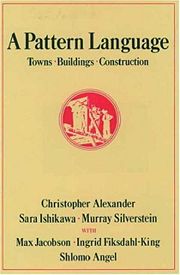Christopher Alexander 1977
(→Summary) |
|||
| (7 intermediate revisions by one user not shown) | |||
| Line 8: | Line 8: | ||
'''Publisher:''' Oxford University Press | '''Publisher:''' Oxford University Press | ||
| + | |||
| + | '''Note:''' Book Two of Three, Christopher Alexander's Theory of Architecture | ||
| + | |||
| + | == Quote About The Text == | ||
| + | ''People liked our book very much. We were surprised though, when we found out computer programmers liked it, because it was about building not programming. But the programmers said, "this is great, it helps think about patterns in programming and how to write reusable code that we can call upon when we need it."'' - [http://www.patternlanguage.com/leveltwo/patternsframe.htm?/leveltwo/../history/ajustsostory6.htm Christopher Alexander's Pattern Website] | ||
== Summary == | == Summary == | ||
| Line 23: | Line 28: | ||
Other interesting points | Other interesting points | ||
* Shakespeare is quoted | * Shakespeare is quoted | ||
| − | * It is quite clear to see the origins of | + | * It is quite clear to see the origins of the [[Extreme programming]] (148,152,157,183) |
| − | * There are ''very'' vague connections with certain design patterns: (194 - [[Observer]], 110,130 - [[Facade]], 98 - [[Composite]], 204 - [[Encapsulation]]) | + | * There are ''very'' vague connections with certain design patterns: (194 - [[Observer]], 110,130 - [[Facade]], 98 - [[Composite]], 204 - [[Encapsulation boundary]]) |
== Additional Resources == | == Additional Resources == | ||
| Line 30: | Line 35: | ||
** For those involved in the Taxi-Bus project, I draw your attention to pattern number 20. | ** For those involved in the Taxi-Bus project, I draw your attention to pattern number 20. | ||
** Number 57 is cute. I approve of 63. 94 provides a refreshing change from modern society. | ** Number 57 is cute. I approve of 63. 94 provides a refreshing change from modern society. | ||
| + | * [http://en.wikipedia.org/wiki/A_Pattern_Language Wikipedia Article] | ||
== See also == | == See also == | ||
* [[Christopher Alexander]] | * [[Christopher Alexander]] | ||
| + | * [[Christopher Alexander 1979]] - ''The Timeless Way of Building'' | ||
[[Category: Resources]] | [[Category: Resources]] | ||
Latest revision as of 12:07, 7 August 2009
Title: A Pattern Language: Towns, Buildings, Construction
Author: Christopher Alexander, Sara Ishikawa & Murray Silverstein with Max Jacobson, Ingrid Fiksdahl-King & Shlomo Angel
Year: 1977
Publisher: Oxford University Press
Note: Book Two of Three, Christopher Alexander's Theory of Architecture
Contents |
Quote About The Text
People liked our book very much. We were surprised though, when we found out computer programmers liked it, because it was about building not programming. But the programmers said, "this is great, it helps think about patterns in programming and how to write reusable code that we can call upon when we need it." - Christopher Alexander's Pattern Website
Summary
This text describes 253 different patterns that are necessary, in the view of the authors, for sustainable and positive living on our planet. Each pattern is described in terms of the conflict that exists in society and a proposed solution. The patterns describe a multitude of facets of human life, including:
- Patterns for political regions and managing bureaucracy
- Patterns on urban and country planning
- Patterns on the necessary state for human interaction and developing culture
- Patterns on societal groupings, learning and working
- Patterns on social interaction
- Patterns on mobility, roading networks and transportation
- Patterns on green areas, central urban areas
- Patterns on household groupings, house design & placement
- Patterns on the layout of a household and garden design
Other interesting points
- Shakespeare is quoted
- It is quite clear to see the origins of the Extreme programming (148,152,157,183)
- There are very vague connections with certain design patterns: (194 - Observer, 110,130 - Facade, 98 - Composite, 204 - Encapsulation boundary)
Additional Resources
- A Pattern Language - This page summarises all of the patterns in the text.
- For those involved in the Taxi-Bus project, I draw your attention to pattern number 20.
- Number 57 is cute. I approve of 63. 94 provides a refreshing change from modern society.
- Wikipedia Article
See also
- Christopher Alexander
- Christopher Alexander 1979 - The Timeless Way of Building
